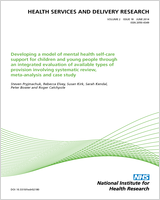NCBI Bookshelf. A service of the National Library of Medicine, National Institutes of Health.
Edge D, Degnan A, Cotterill S, et al. Culturally adapted Family Intervention (CaFI) for African-Caribbean people diagnosed with schizophrenia and their families: a mixed-methods feasibility study of development, implementation and acceptability. Southampton (UK): NIHR Journals Library; 2018 Sep. (Health Services and Delivery Research, No. 6.32.)

Culturally adapted Family Intervention (CaFI) for African-Caribbean people diagnosed with schizophrenia and their families: a mixed-methods feasibility study of development, implementation and acceptability.
Show detailsIn the UK, African-Caribbean people are more likely than members of any other ethnic group to be diagnosed with schizophrenia, but they have worse care and outcomes. Family intervention (FI) is a form of ‘talking treatment’ that helps people with schizophrenia to recover. Services struggle to deliver FI. It is especially difficult for people from minority groups to get FI, so we do not know if FI would work as well for African-Caribbean people as for White British people. We also do not know if African-Caribbean people would like FI, even a version made specifically for them.
Our study aimed to see if:
- we could work with African-Caribbean people and health-care staff to change FI to better meet the needs of this community
- service users who were not in contact with their families could be supported by other people to receive the new therapy.
We were able to change FI. Thirty-one African-Caribbean service users and their families volunteered to test our new Culturally adapted Family Intervention (CaFI). In the end, 26 family units tried CaFI. Nearly all of them (24/26) finished all 10 sessions. Service users, their families and health staff all said that they liked CaFI and would recommend it to other people. As African-Caribbean people have had historically bad experiences of mental health services, this is a good achievement.
It is now important to find out if CaFI prevents people from going back into hospital because of becoming unwell again. This would mean testing CaFI with many more people in different parts of the country to see if it works. We would need to be sure that CaFI worked well before the NHS could fund it. With so many ethnic groups in Britain, we also need to find out if this kind of therapy could be made suitable for people with schizophrenia in all minority ethnic groups (culturally adaptable).
- Plain English summary - Culturally adapted Family Intervention (CaFI) for Africa...Plain English summary - Culturally adapted Family Intervention (CaFI) for African-Caribbean people diagnosed with schizophrenia and their families: a mixed-methods feasibility study of development, implementation and acceptability
- Phase 1 service user participant information sheet - Culturally adapted Family I...Phase 1 service user participant information sheet - Culturally adapted Family Intervention (CaFI) for African-Caribbean people diagnosed with schizophrenia and their families: a mixed-methods feasibility study of development, implementation and acceptability
Your browsing activity is empty.
Activity recording is turned off.
See more...